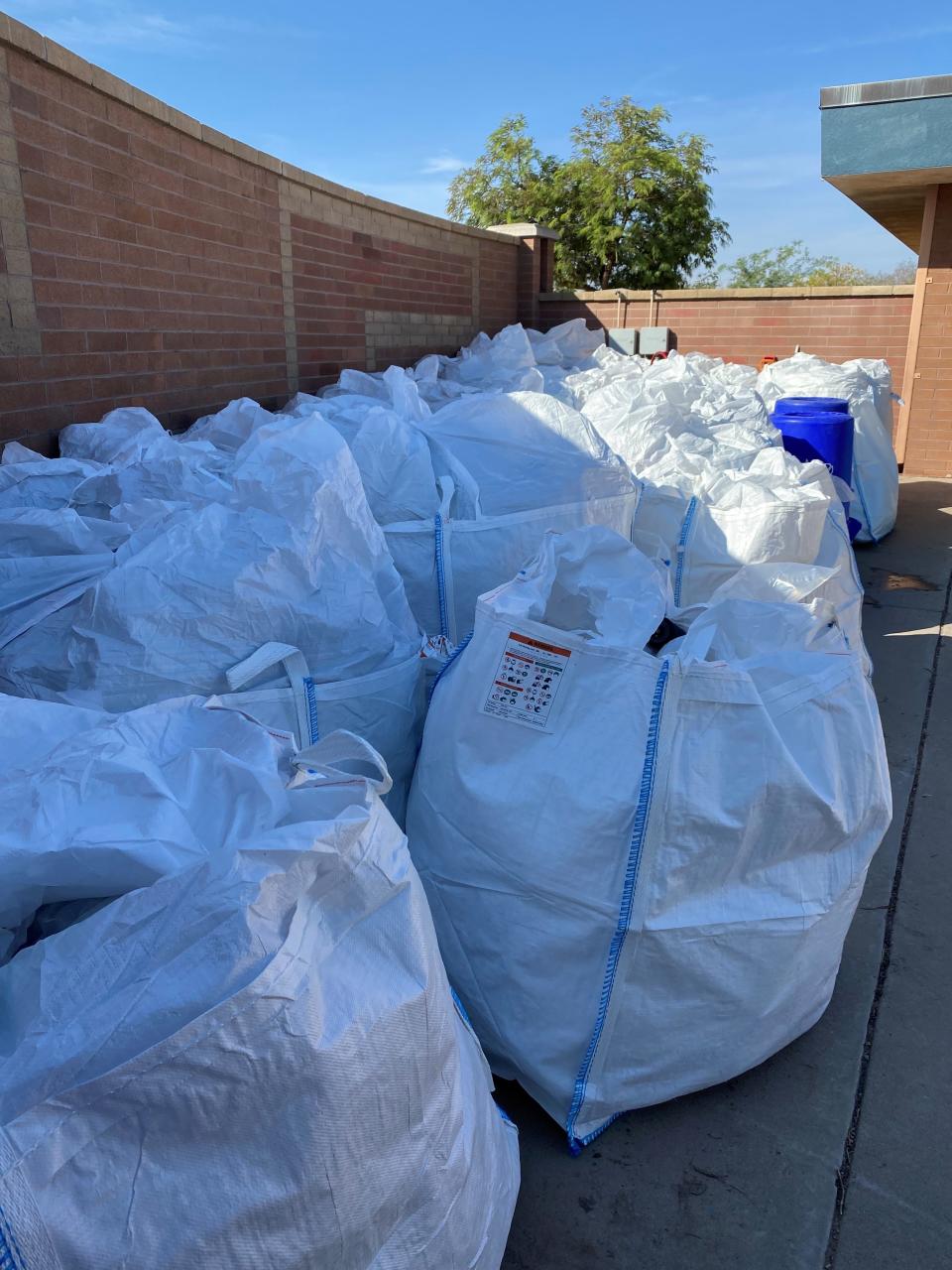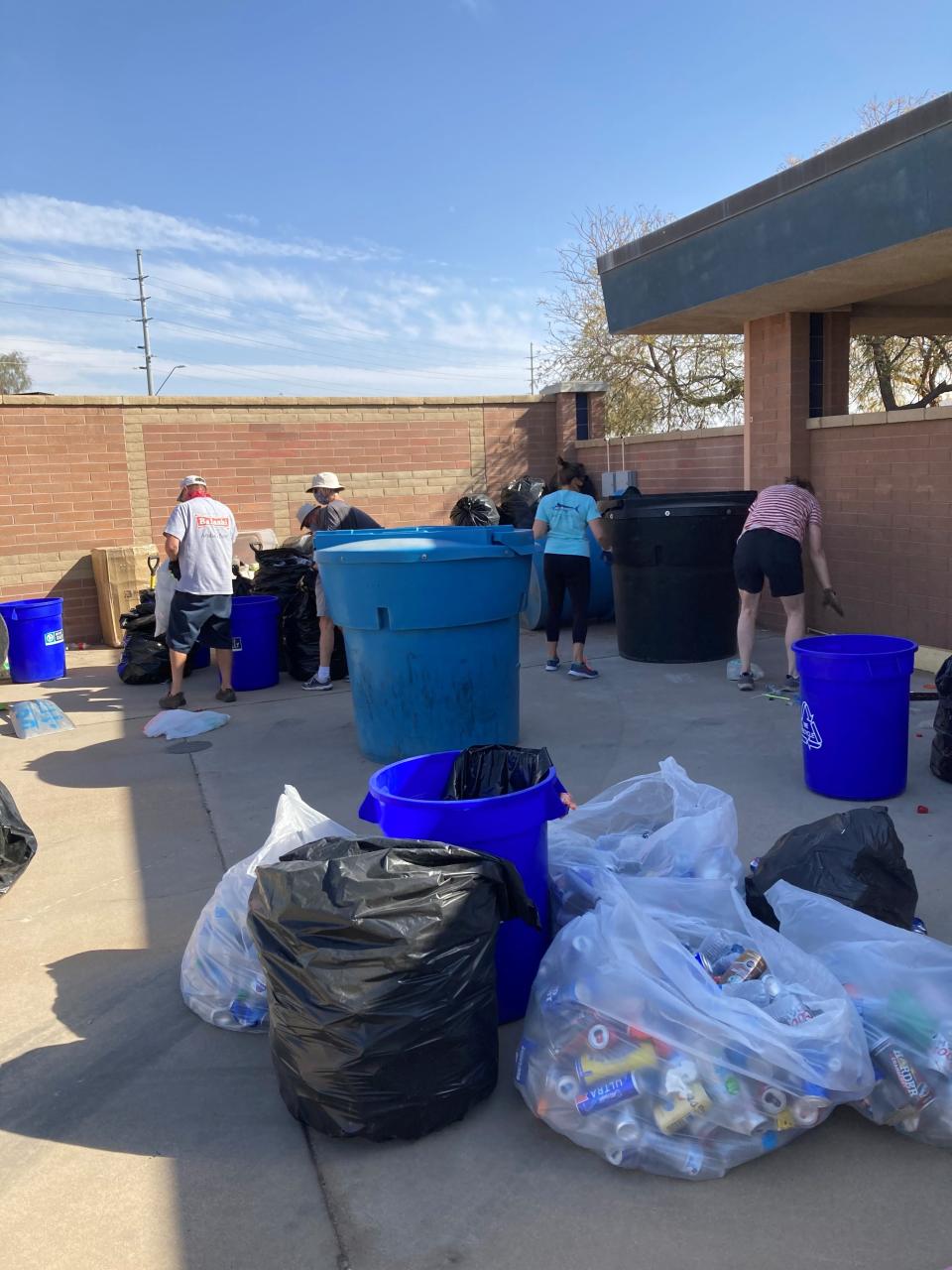Arizona cities struggle to maintain recycling programs because of high costs
Rick Wilson had been running a small recycling operation for over a decade at the back of Mesquite Elementary School, in Casa Grande. Now it's one of the few places where city residents can dispose of their plastic, tin and aluminum.
Casa Grande was one of many cities that about four years ago fully suspended or dramatically reduced their recycling services. Some continued to offer a drop-off alternative, while others retired their recycling containers.
Wilson, a fifth grade teacher, went from running a solo operation collecting 3 pounds of waste a day to processing about 70 pounds a day with the help of 10 volunteers. He is likely getting recyclables from fewer than 800 people, he said, and it’s already demanding.
“My job gets in the way,” Wilson said, joking. “My concern is, if it gets too busy and my volunteers retire, I'm dead in the water because I could not keep up. It's just too much work.”

Many communities in Arizona lack recycling services. A big factor in the decline of programs was that most recycled waste was being purchased by China, and when the country banned imports on foreign recyclable waste in 2018, the prices dropped. It affected recycling profitability throughout the country.
In areas outside of Phoenix and Tucson, recycling was already challenging for a number of reasons: population size and distance from metropolitan areas that complicate the program's finances, a lack of local buyers for the recycled material, and scarce funding. The Arizona Legislature has not appropriated funds for the recycling program in over a decade.
Rajesh Buch, a senior global futures scientist at Arizona State University, and Richard Rushforth, an assistant research professor at Northern Arizona University, are leading a statewide assessment to find solutions to municipal recycling in Arizona.
The team will estimate the amount and type of recyclable waste dumped throughout Arizona, the economic impact that recycling could have, and the cost-benefit of operating recycling programs depending on communities’ size and finances. The data will be available to the public online and allow users to get information on cities’ recycling policies all in one site.
Can I recycle that? Here are guidelines from cities across metro Phoenix
The need to find recycling hubs
About 30 out of 450 cities and towns in Arizona offer some sort of recycling service.
Most communities in the state, 361 of them, are unincorporated. They don’t have a local government and are supported only by county services. Most places lack not only curbside pickup but drop-off locations too, so valuable waste can only go to the landfill, despite residents’ best intentions.
“The best way that (recycling) can work for most of rural Arizona is a hub-and-spoke type system, where one community acts as a hub for six or seven communities to all collect all their recyclables,” said Buch.
Buch also serves as the circular economy practice lead and business development director for ASU’s Rob and Melani Walton Sustainability Solutions Service. He believes even small-scale recycling processing could attract new business and markets into Arizona with the right planning. The team is running several models to draw those scenarios out.
Buch and Rushforth are estimating the amount of recyclable waste produced in Arizona’s 15 counties. The waste stream is divided into 12 major categories: fiber (paper and cardboard), plastic, glass, metal, yard waste, food, textiles, other organics, wood, construction waste, household hazardous waste and electronic waste.
With that baseline they can also calculate what would be the potential job creation and tax revenue.
The research will also provide a much needed information platform for the general public. ADEQ has a list of recycling programs by city, but it's not complete or updated. There is no requirement on either recycling or on data collection in Arizona.
"The landscape of (recycling throughout Arizona) is very fragmented," Rushforth said. Standardization, access and consistency are the biggest challenges.
Data from the research could also help identify hot spots for recycling depending on the material. So far, the team has identified 10-15 potential cluster sites for recycling.
In turn, the models and recycling scenarios give an insight to both cities and investors.
“If you're an investor you want every piece of information that you can get. The information is cumulative," said Kenneth Polasko, chief research and technology commercialization officer with the Arizona Board of Regents.
"That increases your probability that there is a potential investment."
The Board of Regents, the governing body of Arizona's public university system, provides sales-tax-funded grants to projects focused on solving state issues, such as the municipal recycling research.
The purpose of the funds is to address things that affect Arizonans, Polasko said. Recycling is close to most people, who see it as a basic, environmentally friendly action that they support.
Is that glass jar really recyclable? It depends on where you live and how clean it is
The wider economic benefits
Researchers want to find out not only whether recycling programs are financially viable, but how they could boost local and state economies.
“If you have more businesses operating in recycling, they'll require more businesses to provide them with trucks and recycling facilities and so on,” said Timothy James.
The ASU economics department professor is working with the research team to find out what could be the wider economic benefits of these recycling scenarios, what would be the wider impact on job creation, income, and the size of the manufacturing economy, for example.
Arizona already has a number of material recovery facilities, plants that sort recyclable waste. But the material, once it’s processed, goes out of state with very few exceptions.
Recycled materials, such as plastic, can make new products: chairs, containers, mats and carpets, shoes, and cups. But that profit is made outside of Arizona.
“We can collect every last piece of recycled material, but probably 90% of it has to go out of state,” Buch said.
Environment: Your old cellphone and printer are e-waste. Here's why you should recycle them responsibly
The lack of those end markets in Arizona translates not only into higher transportation costs but also lost opportunities.
“It’s not just about trying to increase the scale of our recycling activity,” said James. “It’s also benefiting from the core activity in terms of trying to build a better supply system to it and use the materials more locally.”
Rushforth, at NAU, thinks their research and models for hub-and-spoke recycling can serve as a blueprint for businesses that want to establish in Arizona.
Depending on the amount of recyclable waste, market prices and transportation costs, it can be more profitable to bury waste in a landfill than to recycle. Creating local markets for recycled waste in Arizona could tip the balance.
If the buyer is local, there's a better chance the deal is profitable because transportation is minimized.
“We have a dysfunctional private sector, business model, around landfilling versus using that material for value," Buch said. "That entire mindset has to also change. But you can only do that if you can attract the right kind of end markets, make them local.”
No change without citizen commitment
If recycling is to make its way back to city services, more outreach and education will be key.
After Casa Grande suspended its curbside pickup for recycling, Wilson, the elementary teacher, learned from waste managers that only about 11% of residents were recycling when the program existed.
He believes Mesquite Elementary is receiving plastic and tins from fewer than 2% of Casa Grande residents. Even so, with the sustained help of 10 volunteers, it’s almost too busy to keep up with. Many of them are winter visitors, so his "green team" dwindles in the summer.
Wilson also collects cans and bottles from the local golf course and from the Palm Creek RV community, and hauls it all in a trailer to the H&S Metals Recycling center. The profits, about $6,000 last year, are donated to Casa Grande Food Bank and the Humane Society. This year they’re donating to Laundry of Love and Seeds of Hope too.
“All of it is donated because I want to teach my students community service,” Wilson said. It’s a win-win because people feel good about recycling, and they also know they’re actually helping someone with their actions.

Cathleen Rafferty, a Casa Grande resident who has been volunteering for nearly five years, said helping feed people is the primary reason that many of them do this volunteer work, aside from helping the environment in some way.
Changing behaviors around recycling is a challenge as important to tackle as doing baseline research.
The state needs “not just support for the mechanical facilities in the system and the recycling systems themselves, but kind of a policy shift where we make recycling a virtue as people see it,” said James, the ASU economics researcher.
Residents could be more careful in the way they recycle by not putting dirty recyclable waste on the bin. They could put minimal effort in separating each kind of material into a different bin, instead of the single-stream “blue-bin recycling.”
“If everybody was really, really careful about the way they recycled … that would make recycling facilities much more easy to justify,” James said.
Clara Migoya covers environmental issues for The Arizona Republic and azcentral. Send tips or questions to clara.migoya@arizonarepublic.com.
Environmental coverage on azcentral.com and in The Arizona Republic is supported by a grant from the Nina Mason Pulliam Charitable Trust. Follow The Republic environmental reporting team at environment.azcentral.com and @azcenvironment on Facebook, Twitter and Instagram.
Support environmental journalism in Arizona. Subscribe to azcentral today.
This article originally appeared on Arizona Republic: High costs, low payoffs end recycling programs in Arizona communities

